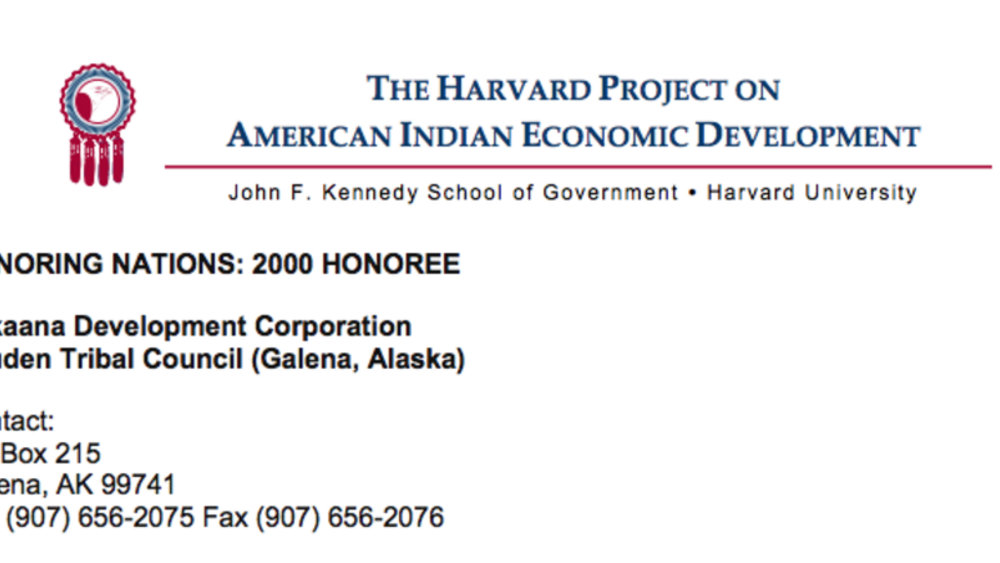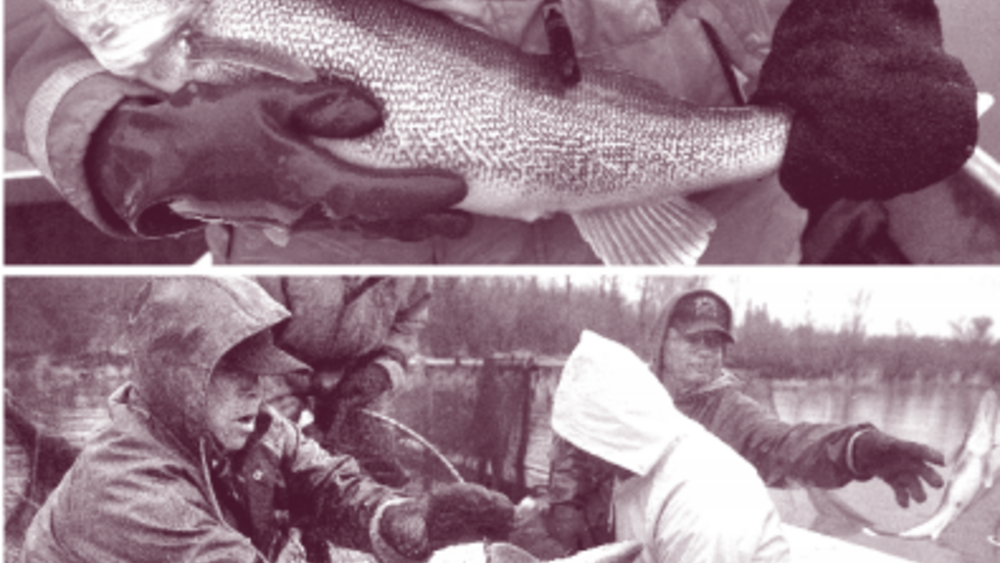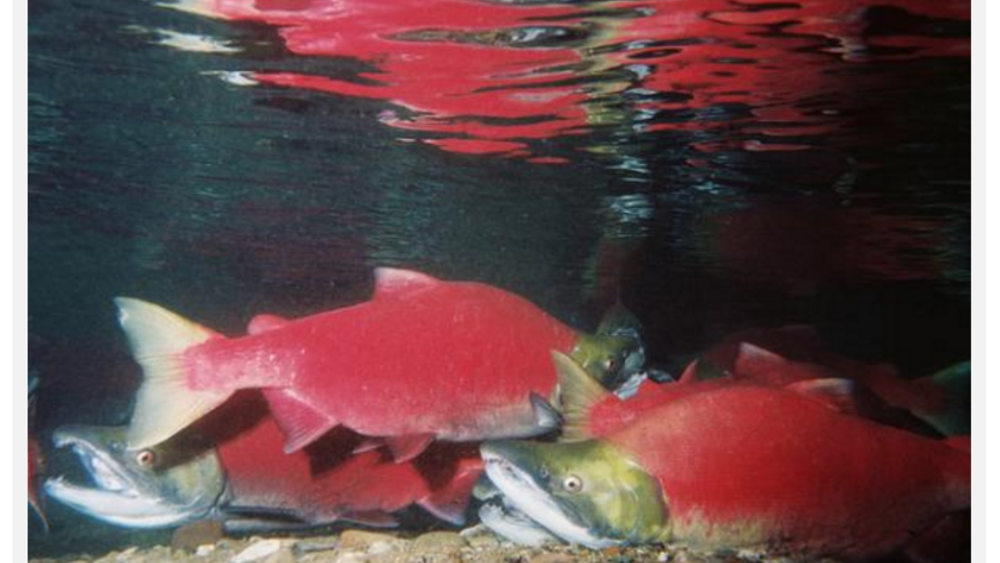Theresa Clark of the Yukaana Development Corporation (YDC) in Alaska describes the environmental catastrophe that prompted YDC's establishment and how YDC is working to build the capacity of its own people to do the important work that YDC does.
Additional Information
Clark, Theresa. "Yukaana Development Corporation." Honoring Nations symposium. Harvard Project on American Indian Economic Development, John F. Kennedy School of Government, Harvard University. Sante Fe, New Mexico. February 8, 2002. Presentation.
Transcript
Andrew Lee:
"Next we have a presentation from an Honoring Nations winner from 2000, the Yukaana Development Corporation, which is a tribal corporation of the Louden Tribe in Galena, Alaska. And we have with us all the way from Galena Theresa Clark and she's the Operations Manager at Yukaana Development Corporation. Welcome."
Theresa Clark:
"Thank you. Good morning, everybody. When Andrew Lee asked me to speak about Yukaana, he asked that I would speak about why Yukaana was created and how our tribe, Louden Tribe, sees Yukaana as a way to exercise sovereignty and pursue self-governance, why Yukaana has been successful and lessons we learned in creating Yukaana.
First off, Yukaana Development Corporation is owned by the Louden Tribe, and Louden is a federally recognized tribe for Galena. Galena is on the Yukon River in interior Alaska. Yukaana was created in 1997 and it was created to address economic development in Galena. The tribe looked at what was the best business to enter and the military, which is also located in Galena was addressing environmental contamination that it created in Galena. The military has had a presence in Galena since the World War II or since 1940 approximately, about that time. So in addressing cleanup, they were contracting out to contractors outside of Galena. So all of the business that was created in Galena was being taken out of Galena including the employment; contractors would come in, they would bring in their own employees. And at that time, less than 20 percent of the employment was in Galena, our local community and tribal members.
How Louden sees Yukaana as a way to exercise the sovereignty and pursue self-governance. Well, Louden's mission is to govern ourselves. Louden is a federally funded, dependent tribe. Most all of Alaska tribes are dependent. It's amazing how much I learned coming down to the lower 48 states of how far we are behind tribes in the lower 48 states. Future profits -- because we do make profits, but they're going back into the business, will be used to fund tribal programs. We'll probably be able to turn some profits over to the tribal council in a couple of years, but the monetary profits aren't the only reason that makes Yukaana successful.
We've partnered with the International Labor Union and the Operating Engineers Union and they bring in the resource of training. They train tribal and community members, because we don't only look after tribal members, we look after our community members, our non-tribal members. They've come in and they provide training and they provide training in the HAZWOPER [Hazardous Waste Operations and Emergency Response], asbestos abatement. That's the type of trainings that they do and they come in every year, they ask us what training needs we need and they come in and they provide these trainings to tribal members at no cost. So we give a lot of training and we can't employ all of our tribal and community members, but they can take these training certifications that they have and they can go outside of Galena. So it provides them another opportunity for employment not only in Galena, but outside of Galena. A lot of this type of training is required on the North Slope or working on the Trans-Alaska Pipeline. It's just creating another opportunity. And so we see this as a success.
Also in our partnership with the unions we...instead of...because we pay the federal wages, which is known as the Davis-Bacon Act wages and in it is included fringe benefits, which we don't pay to the tribal members, we pay into the unions, and this creates an additional health and welfare insurance benefit to them other than coverage by Indian Health Service. In putting into this...we also put in the fringe benefit also includes retirement and the unions retirement takes five years to vest. So we have tribal and community members that are becoming...that [are] fully vested. So not only when they retire they'll have Social Security income, they'll have an additional retirement check to supplement Social Security, which we all know is dwindling.
Yukaana is also supportive of businesses in Galena. We don't compete with businesses owned by community and tribal members. If we need heavy equipment, we'll rent from our local...there's a couple other companies [unintelligible] in Galena. We won't compete with them. We'll support them so we'll rent their equipment or we'll subcontract to them. Those are some of the reasons...
Well, another reason, another big success, or the biggest major success of Yukaana is that our homelands, our environment that's being cleaned up, which the military has left. They came in in the 1940s and the only way to ship petroleum, oil, lubricant products was by barging them down from Nenana where the railroad is and they barged down hundreds of thousands of 55-gallon drums and they just took them out and they deposited them on the lands where they thought that was just a normal way of dumping trash, their trash. We live in a floodplain and a lot of these barrels have floated down the Yukon River to the mouth actually and they all contained gasoline or antifreeze. And so they considered them contaminated so they could no longer use them so all of this has dumped out into the Yukon River and the land. So through contracting them what one of my board members considered [is], 'Who else to know when your lands are clean other than the people that live there?' We get paid by the government for cleaning up our own lands, but the biggest success is that our lands are being cleaned up. In addition to this, there's one story I've got to tell. One of our tribal members that worked all summer cleaning up the lands, and we go out and pick up these barrels and take them and throw them away in the landfill. Well, during the hunting season when he was out hunting, he ran across a barrel and he picked it up and put it in the back of his truck and brought it up to the dump. So he kind of gave some free service to the military.
Lessons that we've learned is that we always have to continuously plan, plan, plan. Working with the military is not easy and so we're always struggling to stay a step ahead of them. The Air Force, the military, they thought that they were just going to give a contract to a little tribe and that we would be happy. They're finding out that it's not true and it's becoming more difficult to work with them. We're addressing our groundwater contamination right now with them. We've got probably an unknown amount of fuel products that leaked through their pipelines and just being dumped that are floating on our water table and it's about a tenth of a mile away from the Yukon River. And it's not known that the fuel has reached the river, which contains our salmon that we're dependent on. We had to educate ourselves to do this. So we're continually having to educate ourselves. So that's a lesson that we learned. We're always continuously having to monitor progress and maintain our relationship with our customer, which is the Air Force. Yukaana itself is developing other customers but the main reason for our success or the main purpose of Yukaana was to clean up the land surrounding Galena and through contracting through the military.
If your tribe is going to create a business to create employment opportunities for tribal members like we have, then continuous training is needed for not only for your board, your management, but your tribal members who are definitely going to be your employees. And of course you all know that policies need to be addressed to address nepotism, personnel issues, health and safety. Health and safety is probably the biggest concern in doing the type of work that we do."



